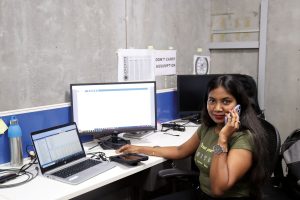Two of Jendamark India’s software developers, Monali Chalwadikar and Pratiksha Sawalakhe, answer some tough questions about the challenges and opportunities for women in the tech industry.

Pratiksha Sawalakhe
Q: Did you always know that working in technology was what you wanted to do?
MC: Honestly, I wanted to be a gynaecologist! Since I couldn’t get a merit seat in college, I opted for engineering. In saying so, I am very much into technology, so I am happy anyway. I have a phobia of electrical wires, so electrical engineering was definitely not an option. I had lot of interest in coding, so I chose computer science.
PS: No, I wanted to become a physiotherapist but because of a lack of knowledge and miscommunication about that field, I was not able to take admission. I did get admission to computer science engineering. Deep down, I knew that I had an interest in technical stuff. When I was about to take the admission for my 11th standard, I had to choose one optional subject, so I chose IT and then I got interested in technology. I used to create small websites and found it very interesting, so I decided to go into computer science.

Monali Chalwadikar
Q: It’s no secret that many women in the tech industry have felt their gender has affected the way that they are perceived or treated. Have you ever been in a situation like that? How did you handle it?
MC: Being a woman is one of the proudest things I can ever experience as a person. Though it sometimes has disadvantages in terms of the treatment or limitations we face because of society and culture. According to my experience so far in the tech industry, I have faced a situation where I have had to adjust or negotiate with regard to a certain privilege and facilities. Sometimes the male ego and insecurities, and lack of belief in my capabilities, also become a very big challenge. I have faced all the situations by having the right attitude, ignoring a condition which doesn’t add value to my personal and professional growth, and by proving myself with all my hard work. Nothing can stop a woman who really has the right attitude and dreams to achieve.
PS: No, I have never been in that situation.
Q: What do you think is the best part of being a woman in the tech industry?
MC: It doesn’t make any difference to me. Being a woman will not give you extra benefits or special treatment. I have achieved everything by proving myself and through all my hard work and right attitude.
PS: The best part as a woman in the tech industry is that you will get to improve your technical skills and personality. And you will never stop learning.
Q: Do you notice a lack of women in technology? If so, why do you think that’s the case?
MC: Yes. Because of lack of family support and sometimes because parents feel that it’s unsafe to support their daughters to leave their city and allow them to live on their own.
PS: Yes, I did notice a lack of women in technology. I think organisations should initiate recruiting more women employees and give them the chance to prove themselves. We need more women who are willing to take on leadership positions. We live in a profoundly connected and global world, and companies that are more diverse will achieve better performance. But my experience tells me that time will not solve the gender leadership gap.
Q: What advice would you give a woman considering a career in the tech industry? What do you wish you had known?
MC: The right guidance and taking opportunities – no matter how small or big the opportunity is. I wish I would have received the right guidance and internships at the right time, which would have helped me grow my knowledge of working as a techy at organisational level in the early phase of my career.
PS: My advice to any woman would be never to miss any opportunity, no matter whether you are in college or an organisation. Just make sure you do your best because small opportunities can make a big difference and it will give you the experience that will definitely take you further.
Q: You’ve both described yourselves as introverts, and even wrote about how to network as an introvert. What is the most difficult thing about being an introvert in the tech industry? How have you overcome it?
MC: When I joined Jendamark India as a fresher, I was an underconfident woman though I had full faith in my abilities. Being an introvert, initially I was struggling to take help from the right connections, and, because of that, I used to get stressed out about not being able to complete a task on time. Then I worked to change into a talkative person, who started communicating with the right people, doing customer presentations, travelling alone, dealing with customers, and late-night, on-site work with seniors. This really helped grow my confidence.
PS: As a Jendamark employee, you get to explore and learn new things. As an introvert, I felt very shy to contact a person I didn’t know, but in my role, I have to speak to people from other departments too. My colleagues help me a lot in becoming a bit more extroverted.
